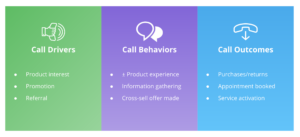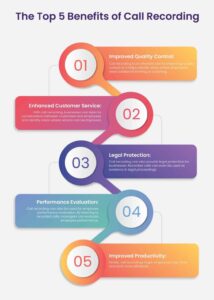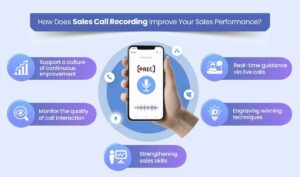
Beyond the Phone Call: Innovative Uses of Call Tracking in Digital Marketing
- touseeq94
- No Comments
In the fast-paced world of digital marketing, marketers are continually seeking new ways to optimize campaigns, increase ROI, and better understand their audience. One of the most powerful, yet often underutilized tools available is call tracking. While many associate call tracking primarily with simply measuring phone calls, its capabilities extend far beyond that. In this article, we will explore how businesses can leverage call tracking in innovative ways to improve their digital marketing strategies, streamline customer interactions, and drive growth.
Call tracking is a method used to trace the source of phone calls and gather data related to caller behavior. With call tracking, marketers can determine which channels, such as social media, search engine ads, or email campaigns, are driving calls. The technology works by assigning unique phone numbers to various marketing channels, making it possible to attribute calls directly to a specific source.
While this basic functionality of call tracking is valuable, the potential applications for businesses and digital marketers go far beyond this simple analysis. By integrating call tracking with other tools and data points, marketers can gain a more comprehensive understanding of their campaigns and customers.
Enhanced Multi-Channel Attribution
One of the most innovative uses of call tracking is enhancing multi-channel attribution. In the digital marketing landscape, customers often interact with multiple touchpoints before converting. They may click an ad, visit a landing page, browse through social media, and finally make a call. With call tracking, businesses can create a clear picture of the customer’s path to conversion.
By integrating call tracking data with customer relationship management (CRM) systems and marketing automation platforms, marketers can follow a potential customer’s entire journey from initial engagement to final purchase. This allows for a more accurate assessment of which channels are most effective, helping businesses allocate their marketing budget more strategically.
Example: A business running a multi-channel campaign that includes Google Ads, Facebook ads, and email marketing can use call tracking to determine which platform was most influential in prompting a call. If calls are mainly generated from Google Ads, the business can invest more in that channel and optimize other aspects of the campaign to further increase its effectiveness.

Improving Lead Qualification and Conversion Rates
Another way call tracking can revolutionize digital marketing is by improving lead qualification. By monitoring call data, businesses can better understand which leads are high-quality and more likely to convert. This is particularly useful for companies that receive a significant volume of calls and want to focus their efforts on the most promising prospects.
Call tracking software often comes with advanced features such as call recording and call scoring. By listening to call recordings, businesses can evaluate the quality of leads and understand how effectively their sales team is handling calls. This information can be used to refine sales scripts, train customer service representatives, and improve conversion rates.
Example: A real estate agency could use call tracking to identify callers who are ready to buy a property versus those who are just browsing. By analyzing keywords used by prospects or the length and quality of their calls, agents can prioritize their time on leads that are more likely to convert, thereby increasing sales and optimizing resources.
Enhancing Customer Experience and Personalisation
Call tracking doesn’t just provide data for marketing optimization; it can also improve customer experience and personalisation. When businesses track the source of a call, they gain valuable insights into the customer’s journey. This information can be used to personalise future interactions and make customers feel valued.
Example: An e-commerce business that receives calls from potential customers who have already interacted with their website can use call tracking data to tailor the conversation. For instance, the sales team could use this information to ask questions based on the customer’s previous interactions, such as, “I see you were looking at our new line of eco-friendly products. How can I assist you with that?” This personal touch helps build rapport and trust, leading to better customer relationships.
![]()
Optimising Marketing Campaigns with Real-Time Data
Real-time data is invaluable in the digital marketing space. Call tracking provides real-time insights that can help marketers make immediate adjustments to their campaigns. With the right call tracking tools, businesses can monitor incoming calls, track call duration, and assess call quality as they happen. This allows marketers to identify which campaigns are performing well and which ones need adjustments.
Example: If a business notices that calls from a specific campaign are leading to higher engagement and conversions compared to others, it can increase its budget for that campaign or replicate the successful elements in other campaigns. On the flip side, if a campaign is underperforming, marketers can use this real-time data to tweak keywords, ad copy, or target audiences.

Leveraging Call Tracking for Voice Search Optimization
With the rise of smart speakers and voice search, optimizing for voice queries has become an essential part of digital marketing. Call tracking can play a significant role in understanding how customers are using voice search and which keywords are driving calls. This information can be used to adapt content and digital strategies to better align with voice search behaviour.
Voice search queries are often longer and more conversational than traditional text-based searches. By analyzing call data, marketers can identify the most common questions and phrases used by customers, which can help shape content, blog posts, and SEO strategies.
Example: A service-based business, like a plumber or electrician, could use call tracking to identify common questions asked via voice search, such as “best plumber near me” or “emergency plumber 24/7.” Understanding these voice search terms allows businesses to adapt their SEO strategy to better capture organic search traffic.

Integrating Call Tracking with AI for Advanced Analytics
The power of call tracking can be amplified by integrating it with artificial intelligence (AI) tools. AI-powered analytics can go beyond the basic call data and provide deeper insights into customer sentiment, trends, and behaviours. With advanced AI tools, businesses can automatically transcribe and analyse call conversations, extracting valuable data points such as sentiment, keywords, and customer concerns.
Example: A health and wellness company could use AI-driven call tracking to identify recurring customer issues, like questions about product ingredients or side effects. This insight allows the company to address these concerns in their marketing and customer service, improving the customer experience and potentially increasing customer loyalty.
Tracking Call Outcomes for Customer Retention
Call tracking can be an essential part of a comprehensive customer retention strategy. By tracking not just the number of calls but also the outcomes, businesses can identify which customer segments are at risk of churn and take proactive steps to retain them. Call data can also reveal opportunities for upselling or cross-selling.
Example: A subscription-based service can use call tracking to assess whether customers are satisfied with their subscription or if they’re considering cancellation. If a call indicates a customer is dissatisfied, the business can use this information to intervene and offer solutions that might keep them as a customer.
Creating Targeted Follow-Up Campaigns
Follow-up campaigns are vital for maintaining customer relationships and driving repeat business. Call tracking helps businesses create targeted follow-up campaigns by analyzing call data and segmenting customers based on their interests, needs, and previous interactions.
Example: A car dealership can use call tracking data to follow up with potential buyers who expressed interest in a specific vehicle but did not complete a purchase. The dealership can send personalised follow-up messages, offering special promotions or scheduling test drives based on the customer’s preferences.
Enhancing Lead Nurturing Strategies
Leads don’t always convert immediately. Effective lead nurturing involves consistent, value-driven communication that guides potential customers through their journey. Call tracking provides businesses with insights into where each lead is in their customer journey, allowing marketers to tailor their lead nurturing strategies accordingly.
Example: A B2B software company could use call tracking to identify potential customers who have shown interest but have not yet made a decision. The business can then send targeted educational content or schedule follow-up calls to further nurture these leads and guide them toward conversion.

Enhancing ROI and Marketing Budget Allocation
Finally, one of the most innovative uses of call tracking is its ability to help businesses maximise their ROI and make more informed marketing budget decisions. Call tracking provides precise data on which channels, campaigns, and keywords are driving calls that result in conversions. This allows marketers to allocate their budgets more efficiently, investing more in high-performing channels and reducing spend on underperforming ones.
Example: A digital marketing agency could use call tracking data to show clients a clear picture of which marketing channels drive the most valuable leads and conversions. By highlighting the cost-per-lead and ROI for each channel, the agency can make better recommendations and help clients optimize their marketing spend.
Improving Customer Feedback and Product Development
Call tracking isn’t just a tool for marketing; it can also be invaluable for gathering customer feedback and guiding product development. By analyzing calls, businesses can gain insights into what customers like, what they struggle with, and what features or services they want to see. This qualitative data can be used to enhance existing products, develop new offerings, and address common customer pain points.
Example: A tech company that sells software tools could use call tracking to monitor user feedback during customer support calls. If a common question or complaint emerges, the company can prioritise product updates or new features based on this data, leading to increased customer satisfaction and a stronger competitive edge.

Strengthening Brand Reputation Management
Call tracking can also play a key role in brand reputation management. By understanding the nature of the calls being received—whether they’re positive, neutral, or negative—businesses can gauge public perception and respond appropriately. Monitoring call content helps identify any recurring issues that may need to be addressed, whether it’s a problem with customer service, product quality, or brand messaging.
Example: A retail brand could use call tracking data to uncover customer sentiments related to their products or services. If a pattern of negative feedback emerges, the brand can take immediate action to correct the issue and implement strategies to restore positive sentiment. This proactive approach helps prevent minor issues from escalating into major PR problems and strengthens overall customer loyalty.
The Future of Call Tracking: Trends to Watch
As digital marketing continues to evolve, so too will the capabilities of call tracking. Emerging technologies and trends are setting the stage for the next generation of call tracking, offering even more sophisticated tools for businesses to leverage. Here are some key trends to look out for:
- Integration with Omnichannel Marketing Platforms
In the future, call tracking will become more seamlessly integrated with comprehensive marketing platforms that manage email, social media, paid advertising, and more. This will allow businesses to track customer journeys across different channels, linking calls with digital interactionsd to build a holistic understanding of the customer lifecycle. - AI and Machine Learning Advancements
AI and machine learning will continue to enhance call tracking systems by providing more nuanced data analysis and predictive insights. Advanced algorithms will be able to segment customer data more effectively and provide actionable recommendations, helping marketers tailor their strategies with greater precision. Real-time analysis will enable marketers to pivot their campaigns instantly based on call sentiment and customer needs. - Enhanced Personalisation Through Voice Recognition
Voice recognition technology will add a new layer of personalisation to call tracking. By identifying customer preferences and history through voice interactions, businesses can create more targeted follow-up actions and customize marketing messages. This will ensure that every customer interaction is meaningful and relevant, fostering deeper relationships between brands and their audiences. - Data Privacy and Compliance Adaptations
With the increasing use of call tracking, staying compliant with data protection regulations such as GDPR and CCPA will be critical. The future will see more advanced tools designed to safeguard customer data while still offering valuable insights. Businesses will need to be proactive in adapting their practices to meet these evolving privacy standards. - Voice Search and Conversational Marketing
As voice search continues to gain traction, the role of call tracking will expand to include insights on voice-based interactions. This will provide an opportunity for businesses to adapt their marketing strategies to align with voice search trends and conversational marketing tactics, ultimately capturing a new segment of customers who prefer hands-free, voice-activated experiences.
Embracing these upcoming trends will enable businesses to stay competitive and harness the full potential of call tracking. By adopting these innovations and integrating them with their current strategies, businesses can continue to create impactful marketing campaigns that resonate with customers and drive measurable growth.
![]()
Embracing the Full Potential of Call Tracking in Digital Marketing
Call tracking has evolved far beyond its original purpose of simply measuring phone calls. Today, it’s an innovative and powerful tool that can be used to enhance multi-channel attribution, optimise marketing campaigns, improve customer experience, and maximise ROI. From voice search optimisation to AI-driven insights and targeted follow-up campaigns, the uses of call tracking in digital marketing are vast and varied.
To truly harness the power of call tracking, businesses need to integrate it with their existing marketing strategies, use data responsibly, and stay ahead of technological advancements. As the digital landscape continues to evolve, call tracking will play an increasingly pivotal role in shaping marketing strategies, boosting customer engagement, and driving sustainable growth.
